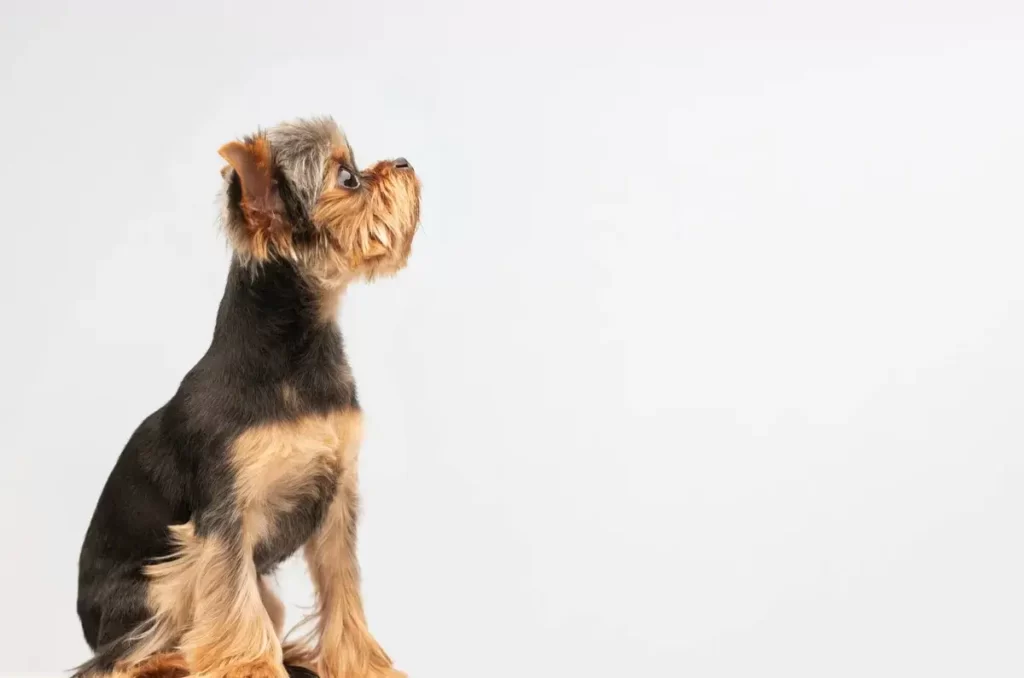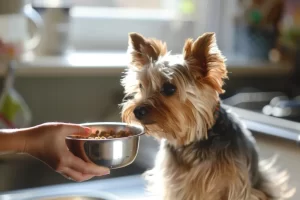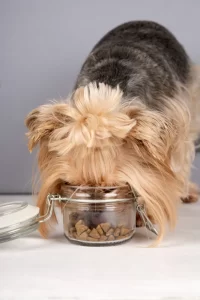Why Positive Reinforcement Works Best for Yorkies
Yorkies are intelligent, spirited, and sometimes a little stubborn. Because of their strong personalities, harsh training methods often backfire, leaving them anxious or resistant. Positive reinforcement, on the other hand, encourages good behavior through rewards, making learning a fun and engaging experience.
Unlike punishment-based methods, positive reinforcement builds trust between you and your Yorkie. When your pup associates obedience with rewards, they naturally want to repeat the behavior. Over time, this creates a strong pattern of learning that sticks.
With Bonnie, I quickly realized that scolding didn’t work. What did work was a cheerful voice, a tasty treat, and lots of praise. She learned faster, wagged her tail through our training sessions, and actually looked forward to practicing commands.
The Power of Treat Rewards
Food is one of the strongest motivators for most dogs, and Yorkies are no exception. Small, tasty treats can work wonders in reinforcing positive behaviors. However, the trick lies in using them wisely and strategically.
For example, when teaching “Sit,” give the treat immediately as your Yorkie performs the action. That instant reward makes the connection clear. If you wait too long, your dog might not understand why they’re being rewarded. Timing is everything in treat training.
With Bonnie, I experimented with different types of treats. Soft, pea-sized pieces of chicken or training-specific treats worked best. I also rotated flavors to keep things exciting. She quickly learned that listening meant something yummy was coming her way.

Using Praise and Affection as Rewards
While treats are powerful, they shouldn’t be the only reward you use. Yorkies thrive on human attention, and praise or affection can be just as motivating. A happy tone of voice, enthusiastic “Good girl!” or a gentle scratch behind the ears communicates approval clearly.
I noticed that Bonnie lights up when I clap my hands or shower her with enthusiastic words after she nails a command. Sometimes, she even seems prouder of the praise than the treat itself. It reminds me that affection is a reward she values deeply.
Mixing praise with treats creates balance. This way, your Yorkie doesn’t become overly dependent on food rewards alone. Eventually, you can phase out treats while keeping praise and affection consistent to maintain good behavior.

Playtime as Positive Reinforcement
Play is another effective and often overlooked reward. Yorkies have high energy levels and love to play fetch, tug-of-war, or chase. Incorporating play into training makes obedience sessions more engaging and keeps your pup mentally and physically stimulated.
For instance, after Bonnie successfully completes a few commands, I’ll toss her favorite toy as a reward. This turns training into a fun game rather than a rigid routine. She associates listening with fun and excitement, which keeps her eager to learn.
Playtime rewards also strengthen your bond. When your Yorkie sees you as both a teacher and a playmate, they’re more likely to stay focused and motivated. This balance of structure and fun creates lasting obedience habits.

The Role of Consistency in Training
Consistency is the backbone of positive reinforcement. If you reward a behavior sometimes but ignore it other times, your Yorkie may become confused and less responsive. Clear, consistent communication helps your pup understand exactly what you expect.
Set specific rules and stick to them. For example, if you don’t want your Yorkie on the couch, don’t allow it “just this once.” Mixed signals undermine training progress. Every family member should follow the same rules to avoid confusing your dog.
With Bonnie, I learned that even small lapses in consistency set us back. But once I became disciplined with rewards and commands, she responded quickly. Dogs thrive on predictability, and Yorkies are no exception.
Redirecting Unwanted Behaviors
Positive reinforcement isn’t just about rewarding good behavior; it’s also about redirecting unwanted actions into something constructive. Instead of punishing, guide your Yorkie toward the behavior you want and reward them when they comply.
For example, if your Yorkie chews on shoes, provide a chew toy instead. The moment they switch to the toy, reward them. Over time, they’ll learn which objects are acceptable. This method avoids fear while teaching the correct choice.
When Bonnie went through her chewing phase, redirection saved my furniture. I filled her toy basket with different textures and shapes. Whenever she grabbed something inappropriate, I offered a toy. Soon enough, she went straight for her toys instead of my slippers.

Training Sessions: Keeping Them Short and Fun
Yorkies have sharp minds but short attention spans. Long, repetitive training sessions can bore them and reduce effectiveness. Instead, aim for short, engaging sessions of 5–10 minutes several times a day.
Keep the mood light and enthusiastic. Use a cheerful voice, move quickly between exercises, and always end on a positive note. Ending a session with a reward leaves your Yorkie excited for the next round.
Bonnie responds best when I keep training playful. If she starts losing interest, I stop and switch to playtime. This prevents frustration and makes sure she always associates training with something enjoyable.

Gradually Phasing Out Treats
While treats are valuable at the start, you don’t want your Yorkie to expect food every single time. Gradually phasing out treats while continuing to use praise, affection, and play helps maintain obedience without over-relying on snacks.
The process is simple: once your Yorkie masters a command, start rewarding every other time. Then, reduce treats further while still giving praise consistently. Eventually, your pup will perform commands even without food because they’ve learned obedience brings other rewards.
With Bonnie, I transitioned slowly. At first, she expected a treat for every “Sit.” But over time, I replaced half the treats with belly rubs and cheerful praise. Now she obeys happily, knowing attention and love are always part of the reward.
Building Trust Through Positive Training
Trust is the foundation of every strong relationship, and positive reinforcement builds it naturally. When your Yorkie knows that listening leads to good things, they see you as a safe and reliable guide. This trust makes future training easier and deepens your bond.
Punishment damages trust, while positive reinforcement strengthens it. A Yorkie that trusts you will not only obey but also feel secure and happy in your presence. This emotional connection matters as much as the obedience itself.
Bonnie trusts me completely now. I see it in her eyes when she looks up, waiting for guidance. That trust didn’t come overnight—it was built through countless moments of patience, encouragement, and rewards.

Positive Reinforcement for Lifelong Obedience
Training doesn’t end after puppyhood. Yorkies benefit from ongoing reinforcement throughout their lives. Regular refresher sessions keep commands sharp, while introducing new tricks prevents boredom and keeps their minds active.
Positive reinforcement techniques can be applied at every stage. Whether it’s teaching a puppy to sit or reminding an adult Yorkie to stay calm when guests arrive, rewards, praise, and play remain effective.
For Bonnie, training has become a lifelong journey. We still practice daily commands, but I also challenge her with new skills. Not only does this keep her sharp, but it also strengthens the bond we share through consistent, positive interaction.
Quick Recap: Positive Reinforcement Essentials
- Use small, tasty treats for instant rewards.
- Combine treats with praise, affection, and play.
- Stay consistent with rules and expectations.
- Redirect unwanted behavior instead of punishing.
- Keep training sessions short, fun, and frequent.
- Gradually phase out treats while keeping praise.
- Build trust through patience and encouragement.
- Reinforce training throughout your Yorkie’s life.






